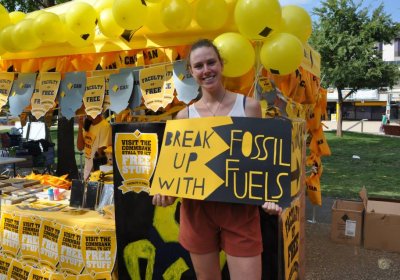Tasmania bans fracking for five years
The Tasmanian Liberal government will extend the ban on gas fracking until 2020 the minister for primary industries Jeremy Rockliff said on February 26. He said the ban was needed to protect the $1 billion a year agriculture industry and “protect Tasmania's reputation for producing fresh, premium and safe produce.” The move has been backed by the Tasmanian Farmers and Graziers' Association, Dairy Australia and Wine Tasmania as well as the Greens.
RADICAL CANDIDATE CHALLENGES CHICAGO MAYOR
Gas
Frack Free Tasmania held a public meeting on February 18 at Sustainable Living Tasmania to warn about possible exploration for shale oil and gas in the island state. The current moratorium on fracking in Tasmania is due to end on March 31.
The government put out an issues paper which received 157 submissions, 90% of which were opposed to fracking being allowed in the state. The government responded to the review on February 26 by extending the moratorium until 2020.
With 44 seats (to the LNPs 42) and the support of Independent Peter Wellington, the ALP leader Annastacia Palaszczuk was sworn in as Premier on February 14. The full Cabinet of 14 (including 8 women) was sworn in on February 16.
The ALP minority government represents a number of firsts for Queensland: first cabinet with a majority of women ministers; first female team of Premier and Deputy Premier (Jacki Trad); and first woman indigenous cabinet minister Leeanne Enoch.
It is assumed that the axing of asset sales will be the first item on the new government’s to-do list.
Hundreds of people started a week-long walk through Sydney’s western suburbs on February 21 to highlight the risk coal seam gas poses to drinking water.
Beginning at Cataract Dam the route will continue for 160 kilometres through Camden, Campbelltown, Liverpool, Fairfield, Prospect, Parramatta, Auburn, Ryde and Gladesville before finishing at Parliament House in Sydney.
More than 10 community groups came together to organise the walk, including the Western Sydney Environment Network, Stop CSG Macarthur, Parramatta Climate Action Network and the Nature Conservation Council of NSW.
In the lead-up to the first global divestment day on February 14, the University of Sydney announced it will reduce the carbon footprint of its investments by 20% within three years by divesting from heavy polluters.
But it has shied away from divesting from fossil fuels altogether.
The decision follows a sustained student-led campaign, with support from Greenpeace, that has been urging the university to completely divest its investments in fossil fuels.
SCOTLAND AND WALES BAN FRACKING
The National Assembly of Wales banned shale gas fracking in Wales on February 4. It follows an announcement on January 28 that the Scottish government will temporarily ban fracking until a public health assessment is completed.
Early last year British Prime Minister David Cameron said his government was going "all out for shale".
Green Left Weekly is now in full colour. The new colour look adds to the attractiveness of Australia's premiere weekly socialist newspaper. It is an important step forward as we seek to further expand our distribution, in a period when the need for progressive alternative sources of news and commentary in this country is more critical than ever.
With the ABC and SBS under attack, and the domination of the Murdochracy in Australia's mass media increasing, it is crucial that people support the alternative media, especially Green Left Weekly.
KENYAN POLICE FIRE TEAR GAS AT CHILDREN'S PLAYGROUND
The ABC reported that Kenyan police fired tear gas into a crowd of schoolchildren in Nairobi as the children protested against what they call an illegal confiscation of a playground.
Around 40 armed police, accompanied by dogs, confronted the children, most of whom were aged between eight and 13.
In a dramatic turn of events, the NSW government has suspended AGL’s licence to operate its Waukivory Pilot Project to mine coal seam gas (CSG) in Gloucester, pending the result of an investigation launched on January 28.
The suspension came just a day after AGL said it was "voluntarily" suspending work at the site after it had detected banned carcinogenic benzene, toluene, ethylbenzene and xylene (BTEX) chemicals in flowback water from two of the four wells and an above-ground storage tank.
NSW SHUTS CSG OPERATIONS IN GLOUCESTER
The New South Wales government has shut down AGL’s coal seam gas operations in Gloucester in northern NSW.
AGL voluntarily suspended operations after it detected benzene, toluene, ethylbenzene and xylenes, also known as BTEX, in flowback water from two of the four wells.
AGL said it did not use the chemicals, banned in CSG operations since 2011, and it was likely to be naturally occurring.
The government has suspended AGL’s licence until an investigation has been completed by the Environmental Protection Agency.
Three years after Barry O'Farrell promised to ban coal seam gas (CSG) mining in Sydney's drinking water catchment, the NSW government’s gas plan says nothing about protecting this sensitive area.
The plan, aimed at defusing community anger about CSG approvals and mining in the lead up to the March state election, has done the opposite.
A report conducted by the Environmental Protection Authority (EPA) has shown environmental concerns and technical lapses in coal seam gas (CSG) mining by Santos at their sites in Gunnedah and the Pilliga Forest, NSW.
The report, published in Fairfax Media, is an audit from May last year.
- Previous page
- Page 17
- Next page








